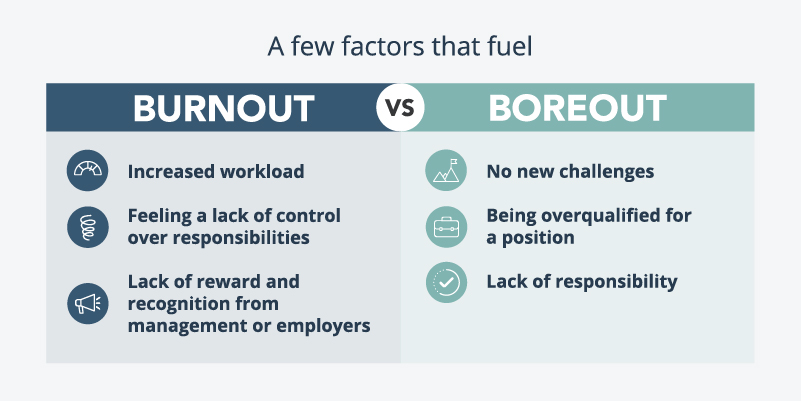Feeling disengaged or unsatisfied at work is often a byproduct of burnout or boreout. The pair have been on two ends of the same spectrum for a long time, but only recently are we learning to identify the root difference between the two. This new interest has individuals and companies alike working to provide solutions to manage them.
What’s the Difference Between Burnout and Boreout?
Burnout is the feeling of significant exhaustion due to stress and impacts everyone at varying levels mentally, emotionally, and physically. Some symptoms can include less energy, loss of appetite, chronic feelings of self-doubt, a sense of failure, loss of motivation, and decreased job satisfaction.
Some factors that contribute to burnout:
- Increased workload.
- Feeling a lack of control over responsibilities.
- Lack of reward and recognition from management or employers.
Burnout has been a topic of conversation for a long time and is often treated as a catch-all explanation for feeling disengaged at work. However, burnout is just one end of a very nuanced spectrum.
Boreout, a feeling that can often mimic burnout, has a different root cause. Boreout often occurs when you’re feeling understimulated, underworked, and/or unchallenged in your job or in your personal life.
A few factors that fuel boreout:
- No new challenges.
- Being overqualified for a position.
- Lack of responsibility.
As we enter a period where we’re working to prioritize employees’ mental health and provide positive experiences at work, knowing how to identify the root cause of your symptoms is key to staying ahead of them.
How to Manage Burnout and Boreout
Managing either of these conditions is very dependent on the individual’s needs. Additionally, they’re on the same spectrum, there are overlaps to how each condition is resolved. Here are a few ways to stay ahead of or manage burnout and boreout.
Prevention
Prevention is the first solution and goal. Your company’s culture and the processes they’ve put in place plays a big role in this, along with your own accountability to actively prevent symptoms from escalating and communicate your desire for new challenges.
Some ideas for preventing burnout and boreout:
- Make time for proper self-care (for example, adequate rest, healthy diet, exercise).
- Identify and set clear boundaries and communicate them to management regularly.
- Practice good time management and learn to say no.
- Explore new skills, take time to give back to your community, or try a new hobby.
- Leverage your company’s PTO policy and take time to rest.
As a busy digital marketing agency and certified B Corporation, giving our employees the tools they need to manage burnout and boreout is important to us. In addition to offering unlimited personal time off, we provide paid volunteer time off so that team members have the space to give back to their communities. Having these two benefits available, and routinely keeping them top-of-mind in our weekly communication, empowers the team to take the time they need to be the best version of themselves.
Reach Out to Management
It’s important to communicate your needs and boundaries as an employee to someone who can ensure they are met. Be transparent about your workload and your hours (if they’re over or under your ideal), ask about company-focused initiatives you could support, inquire about shifting your work schedule, or be honest about needing to hand off a client to someone else.
Reassess Your Goals
Sometimes the feelings of burnout and boreout take such a toll that you need to sit and re-evaluate your career goals or limits. Create a system that helps you keep things in check and allows others to respect and support your boundaries as well.

The experience of burnout or boreout may lead you to wanting different responsibilities or even exploring a different career path. This is a good opportunity to figure out what new skills you’d like to learn or new paths you’d like to explore.
Take Care of Yourself and Stay Motivated
Unfortunately, burnout and boreout can happen to anyone. If left unchecked, they can lead to decreased productivity, poor performance, and even health problems. But with the support of the right company, team, and your own personal accountability to manage them, these two extremes can be overcome.
If you find yourself feeling burnt out or unfulfilled at work, take steps to identify the root cause of the problem and look for ways to solve it. Your health—and your career—will thank you for it!



